Jeffrey T. found this page on Amazon suggesting gifts for different people in your life. He thought it nicely illustrated not only “…gender roles in our society, but also of age roles and, perhaps, class roles as well.”
Here’s the page (below are close up screenshots and quick, snarky comments):
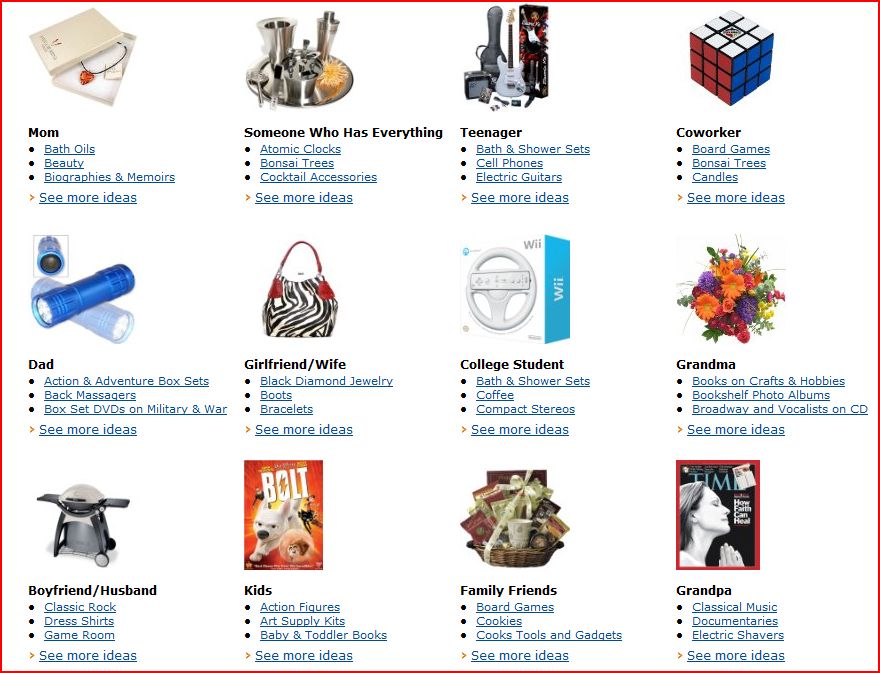
What is a woman’s lifecycle like?
Girlfriends and wives are apparently obsessed with fashion. They want nothing else:

By the time you’re a mom, your interest in fashion is accompanied by escapism and the need for a freakin’ break (jewelry would be nice though):
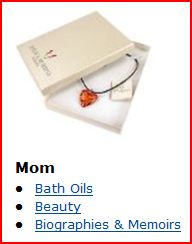
Grandmas love flowers and they fill their days doing crafts, scrapbooking, and listening to showtunes:
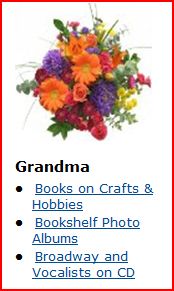
Is it different for men?
After work, husbands/boyfriends take off their dress shirt so they can rock out and play games:
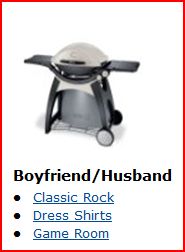
Dads are still into “action and adventure,” but they need a break too and, also, they suddenly feel a pressing need to know more about waging war:

By the time you’re a Grandpa, you just want to find a nice room away from Grandma’s show tunes to listen to classic music, watch documentaries (about war?), and read Time magazine with a safe, clean shave:

People who “have everything” (I think that means rich people), just need totally random unnecessary stuff (except for cocktail accessories, those are obviously a necessity):
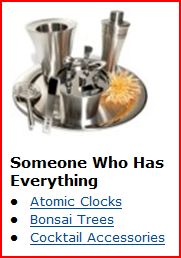
—————————
Lisa Wade is a professor of sociology at Occidental College. You can follow her on Twitter and Facebook.

Comments 25
Dasha — July 5, 2009
I'm thinking about the "teenager" section - does every suggestion there target both males and females? Or is it "bath and shower sets" for teen girls, cell phones for everyone, and "electric guitars" for teen boys? Sure, everyone knows at least a few teenage girls who play electric guitar, but in the surreal world of advertising, they're usually not targeted for this fairly empowering role.
dreikin — July 5, 2009
I don't think the couple -> parents -> grandparents series is supposed to represent the people changing over time, but rather the perception of what these current demographic groups tend to buy/want.
And, since this is Amazon, I think that there is probably more than just stereotyping going on there. Not because I believe Amazon is immune to it, but because one of their more useful technologies is basically a pattern recognition algorithm for who buys what, in order to suggest more targeted products.
dreikin — July 5, 2009
Also - does it strike anyone else as odd that the second item in the "Mom" category is "Beauty"? Not beauty supplies or somesuch, just beauty.
Trabb's Boy — July 5, 2009
I think we should be slaveringly grateful that they offer choices for "kids" instead of "boys" and "girls". That represents very serious progress in my book.
Elena — July 5, 2009
I'm amused by the "How Faith Can Heal" headline on the sample issue of Time being marketed to the elderly. Surely they could've chosen a more neutral cover issue?
Elise — July 5, 2009
Another complication with treating the Partner --> Parent --> Grandparent categories as diachronically sequential is that they're gift-giving guides and therefore their content relies on various conventions we have about who gives what kind of gifts to whom. The Husband/Wife categories are aimed toward people buying gifts for their partners; the Dad/Mom categories are aimed toward people buying gifts for their parents. So the Husband category and the Dad category could be used by two different people to buy gifts for the same individual -- they're not necessarily sequential.
For example, something like massage oil could go in the Wife/Girlfriend category, but it would be pretty weird in the Mom category, because of the various understandings we have about what is and isn't an appropriate gift between parents and their children. It wouldn't mean that we think that wives like massages and mothers don't; it would mean that most of Amazon's customers think children shouldn't be giving their mothers vaguely sexual gifts like massage oil.
Angela — July 5, 2009
Etsy does the same thing =[
Sabrina — July 5, 2009
Actually with the etsy gift guides the shop owner pays to have their wares featured on the guide. So it's the shop owners who decide what goes where and not etsy itself.
Jesse — July 5, 2009
Amazon's use of demographic groups is only interesting to the extent that Amazon is indulging in stereotyping rather than promoting its sales. Does sociology have any way of distinguishing between these two explanations, or is the point to put up some images so that we can "confirm" our prior beliefs in the absence of meaningful evidence?
Rhys — July 5, 2009
Amazon decides which products to emphasize based on buyer statistics, which are then broken down by gender and age group.
Amazon executives don't meet behind closed doors with an agenda of blindly rattling off gender stereotypes - it's an objective process of informed marketing based on what actual groups of people are actually buying.
People are not always victims of external stereotyping, most especially when it comes to materialism - they not only stereotype themselves, but other consumers (one might call this 'internal' stereotyping) to inform their purchases because they want to be seen as 'trendy' and 'in.'
So, in short: you've got it somewhat backwards. Amazon is not stereotyping consumers; the consumers are stereotyping themselves and Amazon is reflecting it.
Monday Catch Up « The Gender Blender Blog — July 5, 2009
[...] Gift giving by stereotypes – an interesting look at the intersection of stereotypes we have about age, class and gender. [...]
Ellen — July 6, 2009
Rhys and Dreiken would be correct if we were talking about the recommendations Amazon makes to individuals based on their buying habits. However, that is not what is going on here. Amazon does not know our demographics (whether we are married, have children, are heterosexual, our age, etc.). They see what my book choices are. They have no idea of my gender, age, or parental status. Their computer program only keeps track of what we buy. That is not going on here. This is marketing going out to everybody. and like most marketing, it is based on cliche's.
To assume that because it is being marketed, that there has been market research that shows it works, is quite a stretch. If you have ever worked at a corporation, you understand that very little market research actually happens.
As far as whether or not amazon is promoting sales or "indulging in stereotyping" isn't that simple. It's a reciprocal relationship. Some people like their stereotypes. It makes the world make sense. And it might even get them to buy a product to help them enact a role that was partly ascribed to them by society and partly chosen. But they learn how to enact that role somewhere. And many it is from the media. So it is an endless cycle really. And those of us who like sociology find it interesting.
Damn I get so tired of defending the sociology on this blog!
Jesse — July 6, 2009
Ellen, you have no evidence that the breakdowns are not based on market research. Sure, your prior belief is that this is all stereotyping, so when you look at the pictures you feel your belief being confirmed. But the pictures have no impact on someone whose prior beliefs are different, who thinks that people of different ages and genders have different buying habits.
It's interesting that you define sociology as "preaching to the choir" and then think that you're "defending" it.
Duran — July 6, 2009
This is hilarious.
By sniping at the "stereotypes" reflected on the page, you are actually critizing the buyers themselves. Amazon serves those lists based on aggregated consumer purchase statistics.
You appear to be confusing cause and effect, something this blog does a lot.
Louisa — July 6, 2009
@ Duran, how do they know the people buying war dvds are dads? How do they know people buying classical music are grandpas? I'm a mom and I haven't filled out anything on Amazon telling them so.
thewhatifgirl — July 7, 2009
I was going to say the same thing, Louisa. I've been buying stuff off of Amazon for at least 6 years and never once have they asked me anything demographic, nor could you know for sure my gender just from my name.
I would say more but Ellen got to it before I did.
The one that is most interesting to me is the "college student" one. It seems to assume (from the "compact stereo") that a college student naturally lives in a dorm. But I have never lived in a dorm in my entire college career and I'd say about half of the student body at my current university now lives in university-sponsored apartments that are apparently quite nice. There are other stereotypes in there too (like, why is the picture a Wii wheel but there is no Wii product in the short list? Do video games automatically equal college students?) but that's what leaped out at me.
Penny — July 8, 2009
"Their computer program only keeps track of what we buy."
They can guess a whole lot from that much. If you buy a lot of parenting books, and toys, and children's sizes in clothing, and Spongebob videos, they're going to assume you're a parent (and probably assume you're the mother of young children). You might not be, that's true; but *in aggregate* the assumption will work well enough for something like gift suggestions.
Also--if you write Amazon reviews of products you didn't buy on Amazon, they can add that to the guessing bin; and they can scan for keywords in your review ("son," "daughter," "husband"). They can also link your purchases and your reviews with your wishlist to get more ideas about who you are. It's not because they care about YOU as an individual; they're just looking for trends (as in "folks who buy this tend to also buy this, and want this as a gift").
I thought this was all pretty obvious to most Amazon users. Don't other people get hilariously wrong or surprisingly right "you may also like" suggestions on their welcome page?
Louisa — July 8, 2009
That's what I'm saying though, they are working off assumptions. They assume you're the mom buying that stuff, but what if you were the dad or the aunt? Or grandma? They don't really know what you are based just on what you buy. From the stuff on my list, they would probably think I was a 10 year old or a grandpa, when I'm neither. I mean, I bought the Animaniacs dvd set and I'm not 10 years old, nor do I have a 10 year old. It may be fair to say, "folks that bought Bach CD also bought Chopin CD" but I can't see where they could pull "Grandpas like classical music CDs" out of that without first jumping to conclusions that the CD was for a grandpa to begin with.
Penny — July 9, 2009
They don't care who you are as an individual. They're looking at bigger patterns. It's a scattershot approach, and it's workable enough if they're right maybe 90% of the time. They're only gift suggestions, afterall. Not much consequence if they're wrong sometimes (or even spectacularly wrong, as they usually are for me).
Gnatalby — July 16, 2009
I'm a bit entertained that "back massager" is a Dad gift. I thought "massager" was a standard euphemism for a gift for a lady.
Sociological Images » What Do People Google? — July 20, 2009
[...] check out our post on Amazon’s gendered gift-giving suggestions. Permalink| Comments (0) Race, Class, and Skin Color in the Movie [...]
Gendered Gifts Galore » Sociological Images — March 5, 2010
[...] also this post on gendered gift-giving guides. var addthis_language = 'en'; Tags: gender, gender: children/youth, holidays, marketing, [...]
vidmate — June 25, 2020
Not because I believe Amazon is immune to it, but because one of their more useful technologies is basically a pattern recognition algorithm for who buys what, in order to suggest more targeted products.
Danny Sk — June 25, 2020
They're looking at bigger patterns. It's a scattershot vidmate approach, and it's workable enough if they're right maybe 90% of the time.
Tif — July 7, 2022
I often take part in a variety of raffles, as for me it’s just a great tool and a way to get what you need for yourself. For instance I often open loot boxes on Drakemall and for only under $15 I even managed to get myself an Iphone and even such an expensive Apple iMac , I was really thrilled indeed. To win it all it is enough to open apple products mystery box and here it will be easy to get such a status prize for a small token amount. I recommend it! It’s definitely worth the draw.